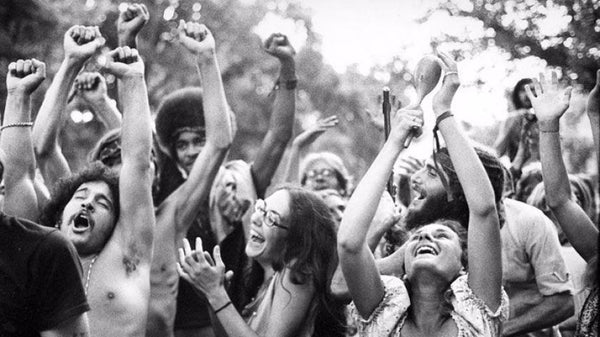This month’s excellent vinyl release “Live From The Summer Of Love” takes us back to 1967 with Quicksilver Messenger Service when the world of Popular Culture was, at least in part, focused on the city of San Francisco and the emergence of the ‘Hippie’, counter-cultural scene. Newsreel footage of the time depicted the city’s Flower Children in their Edenic state, extolling the virtues of Peace and Love, minds expanded (or in some cases, shattered) by psychedelic drugs. To quote the words of poet William Wordsworth, in his work, The Prelude, from 1805, “Bliss was it in that dawn to be alive, but to be young was very heaven”.
Quicksilver Messenger Service were one of the top rank combos of the San Francisco rock scene of 1966/ 67, alongside The Grateful Dead, Jefferson Airplane, and Big Brother & The Holding Company and Moby Grape (The Airplane were the first out of the blocks, recording-wise, releasing their debut album, ‘Takes Off’, in August, 1966). Tougher than Jefferson Airplane, tighter than The Grateful Dead, and trippier than Big Brother & The Holding Company, Quicksilver Messenger Service remain the great unsung heroes of the San Francisco scene.
For a while, it looked like QMS might well emulate the success of their SF contemporaries, but for a variety of reasons – mostly drug busts and internecine conflicts - that didn’t quite happen. In their heyday, however, they produced music of lasting merit, at their very best onstage, when the fiery, intense interplay between their guitarists Gary Duncan and John Cippolina would generate peaks of improvisational excitement that stirred the SF hippies into paroxysms of freakout joy, the in-your-face, unsparingly loud shows mixing with illegal stimulants making for an awesome live experience. The QMS ‘formula’, if one can call it that, was to take Blues and early Rock cover songs, some earthy Folk stuff, with some self-penned material, and put their own, highly idiosyncratic, lysergic-tinged spin on them.
QMS came together in San Francisco as early as 1964. Their line-up comprised John Cipollina (guitar), Dino Valenti (vocals), David Freiberg (bass / vocals), Jim Murray (vocals, harmonica), Casey Sonoban (drums), and briefly, one Alexander ‘Skip’ Spence (guitar / vocals). Sonoban would in short order depart the QMS ranks to line up behind the drums in the early Jefferson Airplane configuration. Of the others, Freiberg was an ex-folkie, and Cipollina had been a real estate salesman. Not long after the band came together, however, Dino Valenti was arrested and jailed on a drug possession charge, which severely impeded their growth. Valenti had already enjoyed considerable success as composer of the classic ‘Hey Joe’, under the sobriquet Chester Powers, and had already made something of a name for himself on the Greenwich Village coffee house circuit in New York. Valenti was unable to rejoin the QMS line-up until 1969.
Valenti’s incarceration was a massive blow to the band; they bided their time awaiting his release in time-honoured Hippy fashion living communally in a basement on Water Street, in SF’s North Beach district. As Cipollina recalled for Pete Frame’s absorbing ‘Rock Family Trees’: “these were the very early days of Psychedelia - lots of LSD, no money, lots of living off the street, which, coming from a good family, was very strange to me!” The band’s line-up was considerably enhanced with the enlistment of Gary Duncan on guitar and vocals, and Greg Elmore taking Sonoban’s place on drums.
Valenti, in the meantime, was eventually freed, but had the misfortune to be busted again two days after his release, and was back in stir in no time. The band soldiered on without him, nonetheless, and soon worked up a strong local following - they had also made it their avowed intent to only play within California’s confines until they were ready to make a big move; they ended up playing some seventy-five shows at SF’s Avalon Ballroom - which gives some indication of the strength of their local following, and the potency of their in-concert majesty. “The audiences got huge,” Freiberg observed. “I remember driving up to the Avalon and seeing the line up and down the block.” “Live, they stood next to The Who, pushing the genre of white R&R to its limits,” critic Gene Sculatti wrote in 1972.
Quicksilver held out longer than the other major Bay Area bands in signing a recording deal, but finally signed with Capitol Records in late 1967, by which time Jim Murray had left the band. Duncan told an interviewer, “We had no ambition toward making records. We just wanted to have fun, play music and make enough money to be able to afford to smoke pot.” It was as a quartet - Cipollina, Duncan, Freiberg and Elmore - that they cut their first two albums for the Capitol Records label – their self-titled debut (released May 1968), and its follow-up, ‘Happy Trails’ (March 1969). The latter is regarded as their defining work, with their cover of Bo Diddley’s ‘Who Do You Love’, recorded live, taking up the entirety of one side of the album. Just as Rick Griffin became synonymous with the Grateful Dead’s album cover art, QMS looked to George Hunter and his Globe Propaganda design company to lend their albums a unique look (though Griffin of course was responsible for the cover of their first album).
Sadly for QMS, their inability to keep a settled line-up long enough hamstrung their progress. That said, their 1969 album, Shady Grove, which featured the great British session keyboard player Nicky Hopkins was a fine effort, and there are frequent reminders of the QMS in all their ragged pomp throughout most of their other albums. However, this set features one of San Francisco’s great combos in their early, live and very LOUD heyday. An era long since past, of course, and these recordings are made all the more poignant by the presence of the long-deceased John Cippolina, who succumbed to emphysema in 1989, that poignancy made all the more piquant with the death of Gary Duncan, aged seventy-two, in June 2019.
There is some frequently great music in this release, and the influence of QMS reverberated through the twin lead guitar line-ups of subsequent acts as diverse as Man, Wishbone Ash, The Allman Brothers Band and even New York Art-rockers Television. There was more than a little magic in QMS; the thrill is still present, and that is definitely something to savour.
With thanks to Alan Robinson

